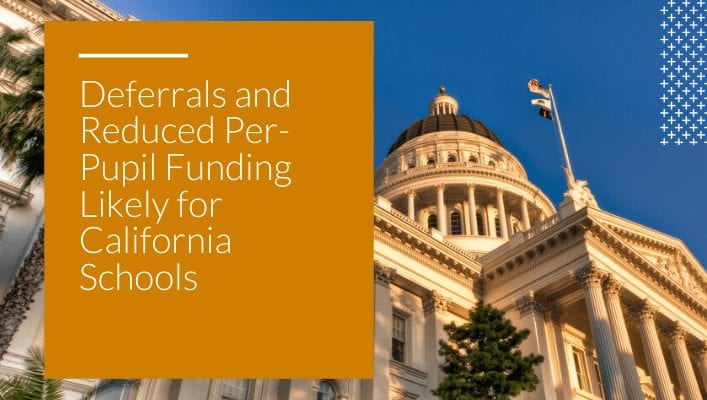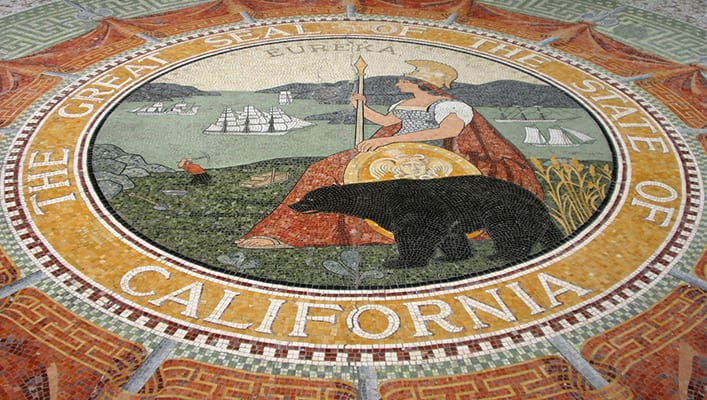
Last week, Governor Gavin Newsom presented his May Revision to the January budget. As expected, state revenues are significantly down, and almost every program will have funding cuts. Given California’s K-12 education system receives a large part of the budget’s funding, it is also receiving a large portion of the cuts. Governor Newsom stated that he would roll back some of the cuts if the Federal Government provides more fiscal relief to the states.
For those who can remember 2008 and the Great Recession, it appears there will be deferrals and reduced per-pupil funding. Below are the highlights of the May Revision, which the California Assembly and Senate Budget Subcommittees will hear over the new two weeks. It is unclear whether the Budget Conference Committee will meet or both houses will adopt the Governor’s budget, but the legislature will pass the budget by June 15th.
The budget provides a Proposition 98 General Fund level of $52.35 billion in 2019-20, a decrease of $3.54 billion under the 2019-20 Budget Act Proposition 98 guarantee estimate. It also provides a Proposition 98 General Fund level of $44.87 billion in 2020-21, a decrease of $11 billion from the 2019-20 Budget Act for schools and community colleges.
Here are the budget specifics:
- Proposes total K-12 funding from all sources at $99.7 Billion in the Budget Year.
- Projects Proposition 98 ongoing per-pupil spending to be $10,632 in 2020-21 and $11,585 in 19-20 a decrease of $1,375 per student and $422 per student, respectively, compared to the 2019-20 Budget Act.
- Defers $1.9 billion in Proposition 98 funding in the 2019-20 budget year to the 2020-21 budget year, and defers an ongoing total of $5.3 billion in financing for the 2020-21 budget year to the 2021-22 budget year.
- Proposes a payback schedule for Proposition 98 funding for the difference between Test 1 and Test 2 funding levels.
- Proposes $4.4 Billion in discretionary federal funds for one-time COVID closure impacts on schools and student learning.
- Suspends the 2.31% Statutory COLA
- Eliminates the $589 million Education Protection Act fund to mitigate school funding cuts.
- Provides $2.3 billion ($1 billion in Budget Year) funding relief for Local Education Agency (LEA) statutory contributions to the STRS and PERS retirement systems.
- Proposes a reduction of $6.5 billion in Proposition 98 funding for the Local Control Funding Formula (LCFF), reflecting a 10% reduction.*
- Provides $645 million Proposition 98 funding for special education services and school readiness supports.
- Proposes $352.9 million in cuts to K-12 categorical programs*
- Contains $164.7 million one-time state-level CARES Act investments to address COVID education impacts, including:
- $100 million to County Offices of Education for student wellness & health initiatives
- $63.2 million for educator training and professional development o $1.5 million for state agency operational needs
- Contains over $23 million in federal IDEA funds for teacher scholarships, mediation costs, and various policy studies and workgroups.
- Maintains a few January Budget new one-time proposals:
- $53 million for literacy grants (related to a court settlement)
- $15 million for CalNEW (refugee student support)
- $4.2 million for the SACS replacement project, and
- $4 million for dyslexia training/research and statewide conference.
- Proposes to increase LEA inter-fund borrowing allowances
- Proposes to allow the sale of surplus LEA property for one-time spending purposes.
- Allows special education telehealth practices.
- Moves the Transitional Kindergarten credential deadline to August 2021.
- Caps the age that particular charter school programs can generate ADA at 26.

